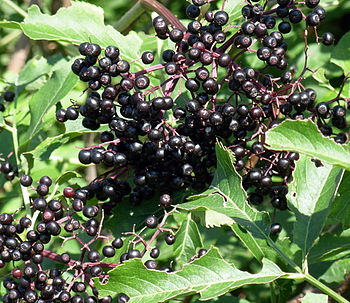Black elderberries (Sambucus nigra) are high in Vitamins A and C. folate, iron and flavonoids, notably anthocyanins which are found in red and purple berries. Their antioxidant capacity is double that of blueberries and significantly higher than in blackberries, goji berries or cranberries.

They have a proven track record of strengthening the immune system and getting rid of colds and the flu. Sambucol is a favored brand, but runs $16 for a 120 ml bottle. You can make your own black elderberry syrup from raw or dried elderberries.
Dried elderberries can be obtained online from reliable vendors like Starwest Botanicals, Mountain Rose Herbs or the Frontier Natural Foods Coop. Black elderberry grows over a broad range in North America and other temperate regions of the world. If you harvest your own, avoid the shrubby dwarf elder (Sambucus ebulus) which can be toxic. Berries start green, turning red, then black when ripe. Don’t eat the berries raw. Always avoid unripe berries, as well as the leaves, seeds, and bark, which contain a chemical related to cyanide, which is poisonous. The flower is medicinal and 1/4 cup could be added to the syrup recipe below.
Black elderberries can be taken preventatively as well as when sick. You take about half the medicinal dose to prevent illness. Elderberry may help treat cold and flu symptoms by reducing congestion and possibly helping you to “sweat it out. One study suggested that using a standardized and proprietary elderberry extract, Sambucol, could shorten the duration of flu by about 3 days. Another study on sinusitus showed that a proprietary elderberry extract increased the ability of antibiotics when used for sinusitus. Black elderberry has been tested as effective against swine flue (H1N1) in vitro but human studies have not yet been done.
Making your own elderberry extract is easy and less expensive. I like to use either a local honey or one with a high phenol content like manuka or eucalyptus honey. Since heating, which strengthens the flavonoids can reduce the Vitamin C content, you may add a powder of a full spectrum Vitamin C, or dried amla or acerola.
- 3/4 cup dried black elderberries
- 2 Tablespoons fresh or 1 Tablespoon dried ginger root
- 1 teaspoon freshly ground cinnamon
- ½ teaspoon cloves
- ½ freshly ground black pepper
- 1 cup raw local, eucalyptus or manuka honey
- optional: 2 Tablespoons Vitamin C, amla or acerola cherry powder
- mason jar or bottle
- coffee grinder, spice grinder or mortar and pestle
- coarse strainer or jelly strainer
- Grind the cinnamon, cloves and peppercorns in a coffee or spice grinder
- Put all the ingredients except the honey in a medium saucepan with about 4 cups of water
- Bring the mixture to a boil, and then reduce the heat to low and let simmer for about 45 minutes. After 45 minutes it should have reduced to about half. This makes the flavonoids more bioavailable
- Remove from heat, and gently mash the black elderberries
- Cook for another 5 minutes
- Strain through a coarse strainer
- Let the mixture cool
- Once it is fully cool, add the honey and stir well
- If you like, add 2 tablespoons of Vitamin C, amla or acerola cherry powder
- Pour into a jar or bottle
Keep your freshly made elderberry syrup in the refrigerator and take as needed. You can take a preventative dose of 1-2 tablespoons daily. When sick, you will probably want to use one dose of 2-3 tablespoons every 2-3 hours for adults and 1-2 tablespoons for children .
There are no known side effects to black elder but theoretical concerns exist for people taking diuretics, insulin, theophylline, autoimmune drugs or laxatives. It has not been studied for use in pregnancy.
………………..
Resources:
Kong F. Pilot clinical study on a proprietary elderberry extract: efficacy in addressing influenza symptoms. Online Journal of Pharmacology and Pharmacokinetics. 2009;5:32-43.
Mikulic-Petkovsek M, Slatnar A, Stampar F, Veberic R. HPLC-MSn identification and quantification of flavanol glycosides in 28 wild and cultivated berry species. Food Chem. 2012;135(4):2138-46.
+Roschek B, Fink RC, McMichael MD, et al. Elderberry flavonoids bind to and prevent H1N1 infection in vitro. Phytochemistry. 2009;70:1255-61.
Roxas M, Jurenka J. Colds and influenza: a review of diagnosis and conventional, botanical, and nutritional considerations. Altern Med Rev. 2007 Mar;12(1):25-48.
Ulbricht C, Basch E, Cheung L, et al. An evidence-based systematic review of elderberry and elderflower(Sambucus nigra) by the Natural Standard Research Collaboration. J Diet Suppl. 2014;11(1):80-120

